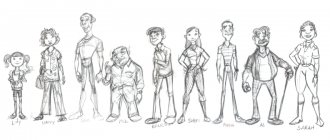Character accentuation is a term that was introduced into psychological science by Karl Leonhard. Lichko's classification was created somewhat later and in many ways it is similar to that of the discoverer.
Both specialists considered accentuation to be a deformation of character, in which some of its features stand out. In modern psychological practice, this position has been somewhat revised. Accentuation is considered a variant of the clinical norm, a feature of the character of a particular person.
In Lichko’s classification there are 11 character accentuations. Each of them has its own characteristics.
Accentuations can be expressed to varying degrees. In the mildest version, we are talking about minor features. Most often there is some kind of golden mean. It is also possible to have a high severity at the level of the borderline of the norm or full-fledged psychopathy or, as they say now, a personality disorder. Psychopathy can also be considered a variant of accentuation, but pathological, overly expressed and dictating the patient’s lifestyle.
What do you need to know about character accentuations according to Lichko’s classification?
Hyperthymic
It is considered perhaps the most dynamic character accentuation in terms of the intensity of the nervous system. People with hyperthymia are sociable and have increased sociability. These are typical extroverts who can find a common language with almost anyone and easily make friends.
Characterized by a group of features:
- Elevated mood. Constantly elevated background. Which generally explains the name of this character accentuation. The emotional component is characterized by high stability. It is difficult to upset such accentuators.
- Sociability. Increased tendency to communicate. In difficult cases, when hyperthymia is pronounced, sociability reaches the point of intrusiveness and even talkativeness. Patients are encouraged to work with this aspect of their personality. Because they can be an obstacle to establishing personal relationships and/or professional growth and development.
- Frivolity reaching the point of absurdity. In the mildest cases there is a minimal problem. When expressed, it carries danger. For example, such a patient is quite capable of wasting his salary on gambling and does not see anything wrong with this.
- Inability to complete a task. A quick change of interests, as an integral part of that same frivolity.
- Communication skills. The ability to make friends and partners. A useful trait for people involved in entrepreneurship and business. Therefore, representatives of this class can be found among professional “dealers”.
- Intolerance of monotony and monotony. What determines professional preferences. For example, such people practically do not engage in scientific activities, since it requires constant concentration. However, they feel great in places where they constantly need to work with others and communicate. For example, in the role of a manager, etc.
- Propensity to take increased risks. Including a passion for gambling, a tendency to risk your life. For example, the latter can manifest itself in extreme sports.
Positivity and sociability are clearly positive traits of hyperthymia. As for the disadvantages of hyperthymia, it is frivolity, a tendency to take unjustified risks. In the middle “position”, if the accentuation is slightly expressed, the negative features are smoothed out.
Degree of severity of accentuations
Trying to give a more precise definition of what character accentuation is, Andrei Lichko identified two groups (or two stages) of accentuations:
- Hidden accentuation. In this case, specific character traits are practically not noticeable, but can manifest themselves in stressful situations and conflicts.
- Explicit accentuation. All specific and problematic character traits are expressed quite strongly and manifest themselves in many life situations. Explicit accentuation is considered an extreme case of the norm.
Accentuation of character is the sum of hereditary characteristics of the psyche, upbringing and accumulated life experience. Usually, the hereditary component under normal conditions of upbringing forms only a hidden form of accentuation, and under the influence of various external factors it can become explicit.
Hysterical
The hysterical type is one of the most difficult in terms of communication with him. Patients themselves do not experience communication problems, but negative traits can seriously complicate the building of close relationships, for example, friendships or romantic ones. Among the features of this class:
Egocentrism. Patients with hysterical accentuation of character are overly selfish. Basically, this becomes an obstacle to normal relationships. As part of psychopathy, such individuals view others only as tools for their own development and benefit.
The desire to be constantly in the spotlight. Increased artistry. At best, such patients choose creative professions, where they sublimate the increased concentration of psychic energy. They transfer it, as they say, into action. On the other hand, much more often the trait takes on a destructive character. For example, attempts at demonstrative suicide are typical. This trait does not contribute to good relations with others.
Inability to take into account other people's interests. Doesn't always happen. Closer to the level of psychopathy. Accompanied by a reluctance and inability to consider other people as equals. And at the same time, a feeling of superiority and arrogance is added.
Active position. A positive trait. Hysteroids often get into trouble and try to be the center of attention. They make excellent civil activists, politicians, lawyers and other people who are involved in socially important matters.
Communication skills. They know how to establish relationships with almost anyone. This is also a merit of artistry, since partners simply do not see negative traits. Hysteroids know how to hide their true face, at least until they get close enough to others.
Persistence to the point of stubbornness. Reluctance to accept another opinion. It is extremely difficult to convince a hysteroid.
Inability to survive “blows of fate.” Despite their apparent impenetrability, these people are not quite what they seem. They are afraid of being ridiculed and misunderstood. In the case of psychopathy, they are especially worried if something does not happen according to their plan.
Intolerance of criticism. Excessive sensitivity.
Increased initiative.
Hysteroids are extremely difficult in terms of communication and close relationships. But thanks to their persistence and initiative, they are indispensable in social work. They have an active creativity. They often choose appropriate professions.
Diagnostic measures
To determine the presence of accentuations use:
- Shmisek test.
- PDO Lichko.
- Leonhard's technique.
It is important to choose the right method to get the most reliable results. It is worth noting that in the development of accentuations there are 2 branches: transient accentuations and permanent ones.
READ In search of mutual understanding: who is an introvert and how to find a common language with him
Some types are characterized by intrapunitive reactions (self-harm and suicide attempts) and extrapunitive reactions (aggression is taken out on surrounding people and objects). In both cases, there is a potential danger, so it is important to recognize and try to correct the accentuation in time.
Also, against the background of long-lasting accentuation in unfavorable conditions, the development of depressive disorders and neuroses is possible. Demonstrative manifestations of accentuations are often observed - vagrancy, drug use, numerous casual sexual relationships.
Astheno-neurotic
One of the weakest types of character accentuation according to Lichko. Accompanied by increased weakness and fatigue. Especially in activities associated with a competitive component. Characterized by a group of positive and negative traits:
- Fatigue, weakness. Especially when working for a long time. Accentants with a weak type of nervous system need constant breaks. They work at their own pace that suits them. These are melancholics, if we speak in the language of temperaments.
- Irritability. Especially if they are touched during the activity. There is no point in disturbing such patients. They don't switch well from one to the other. Prone to depression and bouts of melancholy.
- Hypochondriacity. Astheno-neurotics often look for symptoms of diseases in themselves. Often fatal. They are regular guests of hospitals and clinics.
- Inability to switch from one task to another quickly enough.
- Accuracy.
- Discipline. Willingness to obey authorities. At the same time, often astheno-neurotics do not recognize others and do not respect them just like that. For example, based on the principle of status. The respect of such a person must be earned.
- The ability to engage in monotonous work and other activities that are not related to the requirements of “competition.” Such accentuators work without problems with large amounts of information. They make excellent scientists, especially when combined with schizoid character accentuation. The main thing is not to rush such a patient. An astheno-neurotic person cannot tolerate pressure.
Astheno-neurotic accentuation of character is quite difficult in terms of tolerance. However, such people are distinguished by increased efficiency, high intelligence, and individualism. Therefore, they achieve results in scientific activities without any problems.
Unstable
Severe accentuation in terms of correction. The unstable type is characterized by a tendency towards idleness, laziness and other negative manifestations. Like all other accentuations, it is partly socially conditioned. Therefore, it is possible to correct personality and character violations. There are several features:
- Laziness. Reluctance to do anything. The desire to constantly rest. This is not associated with fatigue and low energy reserves, as in astheno-neurotics. Rather, we are talking about problems with character, a conscious desire to lead such a lifestyle. The disorder is noticeable even in childhood. By adolescence, everything becomes even more obvious.
- Tendency to spend idle time. Sex, alcohol, drugs, games, including gambling. Doing nothing throughout your life. The unstable ones are the real hedonists.
- Problems with work. Since such people are not inclined to learn, improve their level, or develop, there can be serious problems with work, even dependency throughout their lives. The unstable ones are often kept women in the care of rich husbands or gigolos. Although this does not always happen, only if accentuation prevails in a person’s character and is sufficiently pronounced.
- Desire for pleasure. Tendency towards the above-mentioned hedonism. As a rule, such people are looking for simple carnal pleasures - sex, psychoactive substances, alcohol. They try not to touch high matters, and they do not bring them the desired sensations.
- Sociability. A positive trait of the unstable. Helps establish necessary contacts, including business ones.
- Helpfulness.
- Openness. Such people practically do not know how to lie. At least in the early years. Even at the level of psychopathy, such people remain sincere and open.
- Problems in your personal life. Associated with the inability to yield, egocentrism.
Unstable people are complex people. For them, the main risks are to become an alcoholic, die from drugs, and sink to the bottom of society. But with timely correction, there is every chance of coping with negative character traits.
Techniques for character adjustment
Having discovered the presence of accentuation, you should start by working on yourself. Sometimes you can do without correction, but it is necessary if the condition prevents you from adapting to society.
The essence of treatment and prevention of this condition is to weaken the manifestation of an aggravated character trait:
- If the type is hysterical, then you need to stop expecting praise and recognition for your every action, you cannot show posturing and blindly follow fashion.
- Schizoids should learn to understand and accept the emotions of other people and show kindness. A good exercise in this case is “The Choleric Game”: deliberately loud conversation and gestures will help you understand the nature and essence of human emotions.
- Hyperthymia is corrected through learning order and organizing one’s own time.
- Those with a labile type of accentuation should learn to control their own emotions and find balance. Problem solving must be approached from a position of reason, not emotion.
- Cycloids should keep a diary to record their own experiences. Self-analysis will help you understand the reasons for mood changes.
- For sensitive people, a sense of humor will help reduce the feeling of discomfort. It’s also a good idea to praise yourself even for small achievements and stop emphasizing your shortcomings.
If you can’t solve the problem on your own, you can contact a psychologist. The specialist will select one of the methods of psychotherapy - group classes, family sessions, psychotrainings, private conversations or drama techniques in psychology.
Conformal
They live by the principle “live like everyone else and think like others.” As the name suggests, character accentuation. It is extremely difficult to detect in adolescents, since many personality types, including independent-minded ones, are prone to conformism in the early years. To accurately determine and resolve the issue, you need to consult a psychologist. There are several features of this type of character accentuation. In short:
Reluctance to stand out from the crowd. Such people think like everyone else. This is more likely due to the desire to be like everyone else, rather than the lack of one’s own opinion. Although over the years a person gets so accustomed to the role of a biorobot that he actually loses his independence of thinking. In extreme cases, such emphasis leads to fanaticism, including religious fanaticism. Mania and other pathological conditions are possible.
Dependence on other people's opinions. Conformists are extremely dependent on other people's opinions. They strive to earn the praise and approval of others. Their hobbies and lifestyle depend entirely or mainly on their environment. Alcoholics? This means that the conformist will drink too. Religious people? This means the patient will also be religious. And everything like that.
Difficulty lifting. Reluctance to change anything. Problems when you lose your close circle or have to do something new, move to another place.
Low conflict. People of this type are not inclined to conflict. They are more likely to agree with others so as not to stir up abuse, but will not defend their point of view. Especially in a violent way. As, for example, epileptoids do this.
Friendliness.
High expectations, romanticism, vulnerability.
Discipline. Willingness to work and obey. These are helpful people.
The main thing about conformists is their diligence, devotion and discipline. With proper training, they become excellent workers in many areas. Including where you need to communicate with people.
Causes
Many factors can provoke the development of personal accentuation. The main and most common one is genetic predisposition. Another reason is the lack of communication during puberty, when a teenager is ignored by peers and parents. The social environment greatly influences the formation of personality.
The lack of realization of a child’s communicative potential can be hidden not only in parental indifference, but also in overprotection. In this case, this is the reason for the lack of communication with people of the same age, which negatively affects later life.
Accentuation can be caused by unmet personal needs, various complexes, nervous system disorders and other somatic diseases. Statistics show that such manifestations are typical for individuals whose work involves constant communication. This condition is observed in teachers, medical and social workers, media persons and military personnel.
Labile
Characterized by instability of the emotional sphere. Often this is a minimally noticeable manifestation. There are practically no extreme degrees of deviation. The range of the emotional spectrum is minimal. Patients of this type are natural empaths. They have a good sense of the mood and state of others. Typical features include:
- Sensuality and emotionality. Labile individuals are good at feeling the mood of others, so they easily get used to their role and can give the right advice. Therefore, they make good psychologists, psychotherapists and social workers. Patients of the labile type are not deprived of emotions themselves. At the same time, the sensory sphere changes quickly - from joy to sadness. In many ways, the sensations depend on the current interlocutor.
- Difficulty lifting. People with such accentuation of character do not tolerate loneliness and separation well. Therefore, they strive to arrange life so that there are as few changes as possible. This often leads to some problems. For example, patients may give up a promising job just to be with people they care about.
- Sincerity. Openness. Good nature.
- Sociability. Together with sincerity, this makes them excellent interlocutors and advisers.
- Vulnerability. Intolerance of criticism addressed to oneself. Inability to work with this criticism and become better through constructive communication, comments, even friendly ones.
- Responsiveness and compassion. Willingness to help anyone and everyone. Sometimes this trait can become a problem.
Psychologists and social workers work with labile patients. Empathy makes them valuable employees, communicators and partners.
Cycloid
In some respects, cycloids are similar to labile patients. However, the change in mood among the former is much more pronounced. In their development, mood and emotional background go through two phases:
- Hyperthymic. At this time the mood is elevated, even too high.
- In the second phase, subdepression is observed. Decreased emotional background.
In this respect, cycloid people are similar to patients with manic-depressive psychosis. But accentuation is not a disease. This is a premorbid state of personality. By the way, these patients are more likely to develop bipolar affective disorder. Although there is no 100% correlation.
Among the characteristic features of accentuation:
- Sudden mood changes. They may be perceived as characteristics of an unbalanced personality, which is actually not the case. Each phase, be it subdepression or hyperthymia, lasts for several weeks. Then they are replaced by reverse features.
- Excitability. Increased excitability is typical for the hyperthymic phase. A person at this time is active, energetic, ready to move mountains almost literally. Efficiency is off the charts.
- Friendliness and increased sociability in the hyperthymic phase. In this respect, the patient is similar to classic hyperthymic.
- Irritability. Develops against the background of the subdepressive stage of emotional development. At this time, it is better not to touch the person, since biased criticism and conflicts are possible.
- Aggressiveness. Depending on the type of character, it can turn into physical violence. Or, at a minimum, attempts to protect yourself from uncomfortable communication.
- Increased tearfulness.
The cycloid type is active in the hyperthymic phase. It is at this time that he is most active. In some cases, mood changes do not come for months.
As P. B. Gannushkin (1933) wrote, the degree of manifestation of psychopathy “represents a truly confusing wealth of shades - from people whom others consider normal to severe psychotic states requiring internment”1. An attempt to somehow systematize these degrees represents an urgent practical task. This would help clarify the prognosis, could provide assistance in expert practice, and would contribute to a more differentiated approach to family and work readaptation. In recent years, the term “deep psychopathy” has become widespread in forensic psychiatric examination. [Morozov. V. Lunts D.R., Felinskaya N.I., 1976]. It denotes the most severe cases, where, at the height of decompensation, psychotic disorders or loss of the ability to “probabilistically predict one’s activities and appropriate correction of one’s behavior” occur at the height of decompensation, or severe endocrine disorders underlie character disorders [Felinskaya N. I., 1965; Shostakovich B.V., 19711. According to forensic examination materials, cases of psychopathy that exclude sanity in adolescents are much more common than in adults - in 15-17% of examinees instead of 3-5% [Guryeva V.A., Gindikin V. Ya., 1980].
The division of psychopathy into three degrees of severity was carried out by L. I. Spivak (1962) in relation to the explosive type. At the same time, the age of formation, the severity of decompensations, pathological changes on the pneumo- and electroencephalogram, etc. were taken into account. However, the criteria for distinguishing between three degrees of severity were not the subject of a special study.
The degree of character deviation itself is difficult to quantify. The latter can be more easily accomplished using other indicators that depend on these deviations [Lichko A. E., Aleksandrov Ar. A., 1973]. These include: 1) severity, duration and frequency of decompensations, phases, psychogenic reactions and, most importantly, compliance with their strength and characteristics of the causing factors; 2) the severity of extreme forms of behavior disorders; 3) the degree of social (labor, family) maladaptation assessed in the “length report”; 4) the degree of correctness of self-assessment of the characteristics of one’s character, criticality of one’s behavior. For different types of psychopathy, the meaning of each of these indicators will be different, so it should be based on the cumulative assessment of all the listed criteria. Based on the above, we proposed to distinguish three degrees of severity of psychopathy and two degrees of character accentuations. The description of each of them is illustrated by an example related to the same (hysterical) type of character.
Severe psychopathy (grade III). Compensatory mechanisms are extremely weak, barely visible or are only partial, covering only part of the psychopathic characteristics, but here they achieve such overcompensation that they themselves act as psychopathic traits. Compensation is always incomplete and short-lived. Decompensations easily arise from minor causes and even for no apparent reason. At the height of decompensation, the picture can reach a psychotic level (severe dysphoria, depression, twilight states, etc.). With severe degrees of some psychopathy (schizoid, psychasthenic, etc.), diagnostic doubts often arise - whether these cases are a psychopath-like defect in schizophrenia or its sluggish form. However, neither signs of the process nor clear indications of a schizophrenic fur coat suffered in the past can be found. Behavioral disorders can reach the level of criminal offenses, suicidal acts and other actions that threaten serious consequences for the psychopath himself or his loved ones. Usually there is constant and significant social maladjustment. Such teenagers drop out of school early and almost never work, except for short episodes or forced labor conditions. They live at the expense of others or at the expense of the state. A complete inability to maintain family relationships is revealed - ties with the family are severed or extremely strained due to constant conflicts or are in the nature of pathological dependence (a psychopath from one of the family members or the latter from a psychopath). Disadaptation is also clearly evident among peers. Self-assessment of character is incorrect or partial—only a few features are noticed, especially manifestations of pathological overcompensation. Criticism of one’s behavior is noticeably reduced, and at the height of decompensation it can be completely lost.
Gennady U, 18 years old. He has not worked or studied since the age of 15 and is dependent on his elderly grandmother. The father is an alcoholic and abandoned his family long ago. His mother also abused alcohol and died from methyl alcohol poisoning. He was raised by his grandmother, who always indulged him in everything. From early childhood he was disobedient and capricious. From the 1st grade of school, behavioral disorders were discovered: he did not want to study, ran away from lessons, and was rude to teachers. His abilities were satisfactory, but due to absenteeism he duplicated the 3rd and 5th grades. He sought to join the company of older street teenagers. He was detained by the police more than once for petty hooliganism and theft. At the age of 13, due to behavioral disorders, he was first sent to a children's psychiatric hospital, where emotional lability, deceit and a tendency to fantasize were noted. At the age of 15, remaining in the third year in the 5th grade, he dropped out of school. He started working several times in different places: as a shoemaker's apprentice, as a loader, as an ice cream seller, as a helper. He was idle everywhere, was late, skipped work, and then quit work altogether. He spent his days in the company of street teenagers, drank, and took money from kids going to school.
A tendency towards fantasy and pseudology was increasingly revealed. He entertained himself by making false phone calls to the police, firefighters, or ambulance, and at the same time he showed considerable artistry, easily getting used to the role. In a conversation with the doctor on the go, he made up stories that his mother was poisoned by a neighbor out of revenge, that he himself found a large amount of lost money near the bank, described how he spent it, how he allegedly traveled to Sochi; stated that at home he had a secret warehouse of weapons and ammunition collected in places of former battles, that he helped the police catch bandits, etc. He treated his behavior without criticism: he denied some of the offenses, but in others, as well as in his character, he did not saw nothing special.
Marked infantilism is noted - he looks 14-15 years old. Neurological examination and EEG showed no abnormalities.
Survey using PDO. According to the objective assessment scale, a mixed hysteroid-unstable type was diagnosed. There is an indication of the possibility of psychopathy. Conformity is low (typical of the hysterical type), the emancipation reaction is weak. The tendency towards delinquency is indicated by the definition of an unstable type. The attitude towards alcoholism is uncertain. According to the subjective assessment scale, the self-assessment is incorrect: features of the conformal and hyperthymic type are reliably identified, melancholic and asthenoneurotic features are rejected.
Diagnosis. Severe hysteroid-type psychopathy against the background of psychophysical infantilism.
Catamnesis. Over the next two years, he was hospitalized three times in psychiatric hospitals due to decompensation of psychopathy. He hardly works, he started drinking.
Severe psychopathy (degree II). Compensatory mechanisms are unstable, and therefore compensations are short-lived. Decompensation can occur for minor reasons. Severe decompensations and serious behavioral disorders usually follow mental trauma or arise in difficult situations. Social adaptation can be incomplete and unstable. They either quit or resume work or study. Abilities remain unrealized. Relationships with family are full of conflicts or characterized by pathological dependence. Self-esteem of character traits and the degree of self-criticism vary greatly depending on the type of psychopathy.
Alexa and B., 17 years old. He was born with asphyxia, the pregnancy proceeded with toxicosis and a threatening miscarriage. In the first years of life, development is without deviations. Since childhood, he has been prone to fantasizing, stubborn, and disobedient. The parents were elderly, both teachers, and were not unanimous in their educational measures; each tried to overprotect their son in their own way. From the age of 7, in response to lectures for disobedience, he began to run away from home into the forest. Then, in order to punish him, his father himself began to take him into the forest and leave him there alone. There was never any warmth in the relationship between him and his parents. At school, despite his good abilities, he studied very unevenly. He started out with great interest, aiming to be an excellent student, but at the first difficulties he gave up, abandoned classes, and began to skip classes. Then his parents usually transferred him to a new school, where everything started all over again. From the age of 13 it became especially difficult. Due to absenteeism, I doubled the 7th grade and barely finished the 8th grade. He started smoking, violated discipline at school, ran away from home after conflicts with his family, spent the night in basements, and fraudulently collected money from ticket offices on buses. He himself did not return home from running away, but tried to have the police deliver him with a scandal: to do this in the evening he went to bed on the boulevard in the city center, at night he tried to catch the eye of a policeman, etc. After graduating from 8th grade, he demanded from his parents that he be accommodated as a laboratory assistant at a research institute, he considered other work or vocational school unworthy for himself. After being refused the job, he tried to pretend to hang himself in the front door of his house in front of neighbors passing by. He began to spend time in the smoking room of the Public Library, hung around among young men preparing to enter universities, tried to put together: he offered to try his luck by lot - to walk along the railings of the bridge over the Neva, drink from glasses, one of which would contain poison, etc. He gathered listeners around him with his stories. He was hospitalized in a psychiatric hospital. After discharge, he got a job at a factory as a turner's apprentice and entered evening school. However, he quickly abandoned his studies. At home he had conflicts with his parents and after a few months he himself asked to be readmitted to a psychiatric hospital in order to “rest.”
In the conversation, he tried to impress with his originality, flaunted some negative traits of his behavior, but rejected hysterical traits. I made unrealistic plans about entering a university.
Neurological examination and EEG showed no abnormalities.
Survey using PDO. According to the objective assessment scale, a mixed hysteroid-unstable type was diagnosed. Signs have been found that indicate the possibility of psychopathy. Conformity is low, the reaction of emancipation is pronounced. A psychological tendency towards alcoholism was noted. The definition of an unstable type serves as an indication of a psychological tendency toward delinquency. According to the subjective assessment scale, self-esteem is incomplete: the features of the unstable type are reliably identified, but no rejected features have been identified.
Diagnosis Hysteroid psychopathy of severe degree.
Catamnesis. After being discharged, he left both the factory and evening school. He completed short-term courses for film demonstrators, but did not work. I entered medical school, at first I studied with enthusiasm, but soon I got tired of it and began to skip and idle. When threatened with dismissal from the school, he demonstratively opened his veins. He staged another suicidal demonstration after his parents reproached him for being idle - he took blood from his vein with a syringe, diluted it in a bowl of water and showed it to his neighbors, claiming that he had released half a bowl of blood. Then he dropped out of school himself. He married a woman 7 years older than him and was her dependent. Soon he left her, returned to his parents, and began working at the post office as a telegram delivery man.
Moderate psychopathy (grade I). Compensatory mechanisms are quite pronounced. Long-term compensation is possible. Breakdowns are usually situationally determined, their depth and duration are proportional to mental trauma. Decompensations are manifested by an exacerbation of psychopathic traits and behavioral disorders. The latter, however, except in particularly difficult situations, do not reach extreme degrees. Social adaptation is unstable, reduced or limited. With unstable adaptation, breakdowns easily occur. With reduced adaptation, adolescents study or work clearly below their abilities. With limited adaptation, the range of interests is sharply narrowed or the area where productive activity is possible and where outstanding results are sometimes achieved (the so-called “talented psychopaths”) is strictly defined. In other, even close areas, complete inconsistency is immediately revealed. Family relationships are characterized by disharmony and extreme selectivity (excessive attachment to some family members, conflicts and breakup with others). With most types of psychopathy (except for hysterical and unstable), a relatively correct assessment of one’s character traits and criticism of one’s behavior is retained, although not always deep enough.
Alexander F., 16 years old. The mother has a pretentious, theatrical manner of demeanor. Since childhood, she spoiled her son, indulged him in everything, flaunted his abilities to her friends.
The father, passionate about leadership work, had little interest in his son. From childhood he grew up capricious, “he took on everything and soon cooled down.” During his school years he showed good abilities, but was restless. He was fond of reading science fiction. He willingly began to learn to play the piano, but then gave up. He loved to show off in front of his peers and pretended to be the ringleader. In the summer after the 8th grade, I grew my hair long and, in order not to have my hair cut, as the sheet required, I decided to go to a technical school. I chose a technical school, difficult to enter and with a complex study program, but very prestigious among teenagers. I passed the competition, but couldn’t stand the systematic classes - I started playing truant, going to the movies instead of college, and was expelled. He entered the factory as a mechanic's apprentice, but didn't like the work - it was “dirty”, he began to shirk, then quit the factory, declaring that he was preparing to enter a technical school, but spent his time in cheerful companies. He gravitated towards the loafers who gathered near hotels, posing as the son of parents holding high positions. I became interested in pop music and discovered my abilities and knowledge here. He collected a large collection of photographs of modern foreign pop ensembles, knew their repertoire, and understood the peculiarities of performing techniques. I covered all the walls of my room with these photographs, which became a place of pilgrimage for new boyfriends and girlfriends. He willingly acted as a kind of guide in his home museum. I tried to learn Finnish so that I could “talk to tourists,” but soon I also gave up—I got tired of it. He entered into a relationship with a girl of easy virtue. I started drinking (a little good wine, avoided strong drinks). Coming home in a state of slight intoxication, he would throw hysterics at his mother: he would scream, sob, roll on the floor, demand significant sums of money for fashionable clothes, and reproach him for “walking like a ragamuffin.” In response to his parents’ reproaches for idleness in front of their eyes, he cut the veins on his hands. I bought a syringe and hid it at home so that my mother would definitely find it. He wanted her to mistake him for a drug addict. After being accused of parasitism, he acted out a “madness” in front of his mother at home: he undressed naked and lay down on the floor, tried to break windows, shouted that he was a drug addict. When sent to a psychiatric hospital, he tried to pass himself off as a drug addict. In the hospital, he was drawn to antisocial teenagers and tried to impress them. He told the doctor that he was preparing to enter the law faculty.
Survey using PDO. According to the objective assessment scale, a mixed hysteroid-unstable type was diagnosed. There were no signs indicating the possibility of psychopathy. A tendency to dissimulate character traits and personal relationships has been noted. Conformity is average, the emancipation reaction is moderate (dissimulation of nonconformity and the desire for emancipation is possible). A psychological tendency towards delinquency and alcoholism was discovered. According to the subjective assessment scale, the self-assessment is incorrect: hyperthymic features are reliably highlighted, while features of the asthenoneurotic type are rejected.
Diagnosis. Hysterical psychopathy of moderate degree.
Catamnesis. After his discharge, he became a mechanic's apprentice at another plant, where his mother worked in the administration. There they tolerated his absenteeism and shirking from work for a year and a half, then fired him. He didn’t get a new job, “waited for conscription,” and spent his time in companies imitating hippies.
Differentiating between moderate psychopathy and character accentuations in adolescence is often not an easy task, since against the background of accentuations such behavioral disorders may arise that give the impression of being psychopathic.
Our observations prompted us to identify two degrees of character accentuation, one of them - obvious accentuation - belongs to the extreme, and the other - hidden accentuation - to the usual variants of the norm.
Explicit accentuation. Characterized by the presence of pronounced traits of a certain type of character. A carefully collected anamnesis, information from loved ones, and short-term observation of behavior, especially among peers, make it possible to recognize this type. However, the severity of traits of any type does not usually prevent satisfactory social adaptation. The position occupied corresponds to abilities and capabilities. Accentuated character traits are usually well compensated, although during puberty they tend to become sharper and can cause temporary adaptation disorders. However, transient social maladjustment and behavioral disorders arise only after those mental traumas and in those difficult situations that place increased demands on the “place of least resistance” of this type of accentuation.
Nikita B, 18 years old. The father left the family when his son was 10 years old and showed no interest in him. His mother is an associate professor of mathematics, seriously ill with polyarthritis, bedridden for many years, and has a Group I disability. Grandma runs the house. Since childhood, he was distinguished by his whims and egocentrism. He demanded beautiful clothes for himself, despised his younger brother for helping with the housework. He was the favorite of his grandmother, who secretly gave him money for sweets and entertainment, secretly from his mother. He studied well, his school years passed without any behavioral problems. He graduated from 10th grade, tried to enter the geography department of the university, and boasted to his friends that he would travel abroad a lot. I didn’t pass the competition and got a job as a laboratory assistant at a research institute in the hope of entering university next year. Possessing an attractive appearance, he began to make acquaintances with women older than himself at work, took advantage of their attention, services, etc. He himself did not care about his mother, lived off her pension, did not give her the money he earned, and spent it on fashionable clothes. Unexpectedly, I received a notification about the upcoming conscription into the army. He believed that due to his mother’s disability he would receive an exemption. However, his mother called the military registration and enlistment office and asked to take him into military service, since it was not he who supported her, but she who supported him. Having learned about this at the military registration and enlistment office, having come home, in front of his mother’s eyes, he drank, in his words, “thirty tablets of diphenhydramine.” Then he began to behave ridiculously - he laughed hysterically, pretended to catch something on the wall, answered inappropriately. When they called an ambulance, he willingly went to the hospital.
Upon admission, he initially claimed that he didn’t remember anything. Then he stated that he tried to commit suicide because of unsuccessful love - allegedly the colleague with whom he was in love broke ties with him. When the doctor tried to contact his work, he immediately asked not to report anything there. He admitted that he was offended by his mother and wanted to avoid being drafted into the army so as “not to waste time there.” He became worried when he learned that the exemption from military service due to mental illness, which he had hoped for, would adversely affect his high aspirations for his future. He willingly agreed to serve in the army.
Survey using PDO. According to the objective assessment scale, the hysteroid type was diagnosed. There were no signs indicating the possibility of psychopathy. A tendency to dissimulate character traits and personal relationships has been noted. Conformity is average, the emancipation reaction is moderate, no psychological tendency to delinquency has been identified, a strong psychological tendency to alcoholism has been established (in connection with the definition of the hysterical type and dissimulation, nonconformism and the emancipation reaction can be disguised, and a high tendency to alcoholism is demonstrative in nature).
According to the subjective assessment scale, self-esteem is incorrect: hyperthymic features are reliably highlighted, asthenoneurotic and sensitive features are rejected.
Diagnosis. An acute demonstrative affective reaction against the background of obvious accentuation of the hysteroid type.
Follow-up in a year. Serving in the Army.
Hidden accentuation. Under normal conditions, traits of a certain type of character are weakly expressed or not visible at all. Even with prolonged observation, varied contacts and detailed acquaintance with the biography, it is difficult to form a clear idea of a certain type of character. However, the traits of this type clearly appear, sometimes unexpectedly for others, under the influence of certain situations or mental traumas, but again only those that place increased demands on the “place of least resistance.” Mental traumas of other kinds, even severe ones, may not reveal the type of character. Identification of accentuated traits, as a rule, does not lead to noticeable maladjustment or it is short-lived. Self-esteem can include both latent traits and opposite traits that are a consequence of compensation. Therefore, seemingly incompatible combinations of schizoidism and hyperthymia, hysteria and psychasthenicity, etc. may appear in self-esteem.
M i h a i l B., 16 years old There is a conflictual relationship in the family between a strict father and maternal grandmother, who has been spoiling her grandson since childhood. She does not like her father and considers him a despot. Although he exploits the grandmother, he tries to “not notice.” He is strongly attached to his mother, whom he is jealous of his father. He studies satisfactorily, there were no significant behavioral disorders, but he shows a tendency to protest reactions. From the age of 13 he began to smoke a lot, “to spite his father,” who beat him for smoking with friends. He grew his hair long, which annoyed his father. When teachers demanded that he cut his hair, he shaved his head so that he could “walk around school like a criminal released from prison.” Relations with friends are good, but with some teachers there are conflicts. He especially hates the teacher, who in front of the whole class called him a repeater (in the 8th grade he remained in the second year due to several exacerbations of chronic pneumonia). After graduating from school, he wants to become an intercity bus driver, carrying tourists. This choice also sounds like a protest to the father, who dreams of higher education for his son.
About six months ago in... got involved with a classmate who at first accepted his advances and then gave preference to another young man. He told him about this demonstratively in the presence of other classmates. It was hard not only for the breakup itself, but also for being humiliated in front of his peers. According to him, he decided to intimidate his beloved, to show what he was capable of. Returning from school to being home alone, I calculated the moment when the parents should return from work, and then this girl should call on business. I took 10 tablets of Seduxen and 15 tablets of Belloid. I left the girl a farewell note: “My train is leaving, I wish you happiness.” I fell asleep and woke up in the intensive care unit. According to him, “this, on the one hand, is good - she will think that I am serious, but, on the other hand, why was it necessary to bring me to a psychiatric hospital?” While in the hospital, he made peace with his lover, who again began to show attention to him. I’m only concerned that his action might prevent him from obtaining a driver’s license in the future.
In conversations with doctors, in communication with peers and with medical staff, he does not reveal any showmanship, posing, or other hysterical traits. Survey using PDO. According to the objective assessment scale, the hysteroid type was diagnosed. A tendency to dissimulate character traits and personal relationships has been noted. Conformity is moderate, the emancipation reaction is very strong (characteristic of the “steroid type”) There is a psychological tendency towards delinquency and alcoholism, which, given the definition of the hysterical type and dissimulation, can be demonstrative in nature. According to the subjective assessment scale, self-esteem is incorrect: hyperthymic features are reliably highlighted, melancholic features are rejected.
Diagnosis. Acute affective reaction with a suicide attempt against the background of hidden accentuation of the hysteroid type.
Catamnesis. Graduated from 10th grade. There were no repeated suicide attempts or noticeable behavioral disturbances. Six months later, in a frank conversation, he admitted that his suicide attempt reflected “a momentary decision to give up his life,” since the situation then seemed unbearable to him. He mistakenly thought that belloid was a strong poison, “confused with henbane.”
He said that upon admission to a psychiatric hospital, when he was waiting for an examination in the emergency room, “one alcoholic taught me to tell the doctors that I only wanted to scare the girl, but I miscalculated and took too much.” That’s what I did in order to “check out faster.”
Using the proposed working scheme for dividing psychopathy by severity and accentuations by severity, we assessed 300 male adolescents from 14 to 18 years old who were admitted to an adolescent psychiatric clinic for non-psychotic behavioral disorders, acute affective reactions, reactive states, but without phenomena of psychosis and mental retardation. In all these cases, the question of diagnosing psychopathy was raised (Table 1).
Table 1. Frequency of different degrees of severity of psychopathy and severity of character accentuations among male adolescents admitted to a psychiatric hospital
psychopathy (174)
| Severity or severity | Number of cases | Percentage of total (300) | Percentage of number | |
| accentuations (126) | ||||
| Psychopathy: | ||||
| heavy | 36 | 12 | 20 | |
| expressed | 84 | 28 | 48 | |
| moderate | 54 | 18 | 32 | |
| Total | 174 | 58 | 100 | |
| Accentuations: | ||||
| obvious | 93 | 31 | 74 | |
| hidden | 33 | 11 | 26 | |
| Total | 126 | 42 | 100 | |
Naturally, the given frequencies refer only to the population of adolescents admitted to psychiatric hospitals. When examining adolescents who are registered in psychoneurological dispensaries, but who have not been hospitalized, apparently, the proportion of moderate psychopathy and character accentuations increases significantly. In a healthy population of adolescents, the percentage of psychopathy that is beyond the attention of a psychiatrist will probably be an insignificant proportion, and accentuation will be only a small part.
According to K. Leonhard (1968), in developed countries “accentuated personalities” make up almost half of the population. Perhaps this is true if we take into account both obvious and hidden accentuations. It is quite difficult to judge the frequency of obvious accentuations in the adolescent population. Mass examinations are possible using a special psychological method - the “Pathocharacterological diagnostic questionnaire for adolescents” - PDO (1976) and its improved version (“Pathocharacterological studies ...”, 1981). This method reveals both obvious and hidden accentuations, and one might think that the latter make up the overwhelming majority.
According to our employee N. Ya. Ivanov (1976), the frequency of character accentuations (explicit and hidden) in different groups of adolescents ranges from 33 to 88% (Table 2). This value turned out to be highest in an English school and lowest for boys in a closed educational institution with strict medical selection and a regulated disciplinary regime (Arctic School), and for girls in a pedagogical school that trains kindergarten teachers.
Table 2. Frequency (in%) of identification of character accentuations in the population of adolescents using PDO (according to N. Ya. Ivanov, 1976)
| Contingent of surveyed | Gender of teenagers | |
| male | female | |
| Age 14 - 15 years: | ||
| 8th grade high school | 52 | 42 |
| Age 16 - 17 years: | ||
| 9th - 10th grade of secondary school | 50 | 38 |
| 1-2nd year vocational school | 73 | 62 |
| 9th - 10th grade math school | 52 | 67 |
| Same thing - English school | 88 | 79 |
| Arctic Maritime School | 33 | |
| Pedagogical school preparing | — | 35 |
| kindergarten teachers | ||
| Physical education college | 68 | 58 |
Sensitive
Unusual accentuation. Its defining features are:
Impressionability. Even an event that is minimal by the standards of others can leave an indelible mark on the personality and consciousness of such an individual. In this, sensitive accentuation is similar to stuck according to Leonard. Memories, especially unpleasant ones, can persist for many years and flash back to the memory with intensity, as if it had just happened.
Vulnerability. Increased sensitivity to criticism, especially public criticism. In this respect, sensitives are very similar to hysteroids. Their main fear is being ridiculed. By the way, due to their vulnerability and daydreaming, such people often become the subject of ridicule and bullying, mainly in their teenage years.
A penchant for aesthetic contemplation. Sensitive people get pleasure from good music, haute cuisine, beautiful paintings and the like. They are mainly interested in lofty matters.
Increased morality. Conscientiousness. In a system with empathy, these traits allow the sensitive to achieve success in the fields of art, science, and social activities.
Openness. Sincerity in communication and relationships. Also loyalty and devotion to friends and partner.
Compassion. Willingness to help anyone and everyone. Unfortunately, sensitives do not always understand people accurately. Therefore, it is possible to help those who are not worthy of it.
Tendency for social recognition. Despite all that has been said, sensitive individuals are not without certain ambitions. They strive to do things that will bring not only benefit, but also recognition. For example, scientific or artistic activities, depending on interests.
Sensitive accentuation is partly similar to labile accentuation. With the difference that the described type of character accentuation is less adapted to life and tolerates criticism and attacks from others less well.
Psychasthenic
A defining personality trait is the tendency to introspect. However, this is not the only typical feature of psychasthenics. Among the features:
- Reflection. Increased tendency to understand oneself. In severe clinical cases, at a level close to psychopathy, we are talking about soul-searching. Self-flagellation and self-pity are also possible. Hence the reluctance to do anything and the loss of initiative. With proper character development, it is possible to overcome this trait and turn reflection into a development tool.
- Self-criticism. Reaching, as was said, to self-flagellation. Psychasthenics have a good memory, so they remember all their mistakes. The problem is that mistakes are often not as bad as the patient thinks. But he cannot accept them. Hence the false desire for perfection, pathological perfectionism.
- Diffidence. Before doing anything, such a patient thinks for a long time and does not act. In this case, prudence plays a negative role. For example, such patients think too long even under completely positive external conditions. Those who themselves tell you to act, not think.
- Fear of making a mistake. At the pathological level. A person will think for a long time, reflect, instead of doing. Often because of this, psychasthenics miss good opportunities in work and personal relationships.
- Fear of censure. Reluctance to criticize. Accompanied by a pathological fear of crowds. People of this type do not like and do not know how to speak in public. They may experience problems in their personal life, since it is always associated with some kind of evaluation. On a subconscious level, all these problems become obstacles to development.
- Reluctance to take responsibility even for one's own actions. The main negative feature of psychasthenics.
- Loyalty and reliability. Both in personal relationships and at work. Diligence and willingness to work for the common good are typical. Psychasthenics also do not forget about themselves.
- The real scourge of patients is low self-esteem. When a person does not believe in his own strength, he considers himself flawed and inferior.
Psychasthenics are faithful and devoted husbands and wives, valuable workers. The main study concerns self-doubt and pathological self-examination, reflection, which often turns out to be a brake on development. The problem should be worked through with a psychologist or, in advanced cases, with a psychotherapist.
Schizoid type
Like other premorbid personality types according to Lichko, it is characterized by an increased risk of transformation into psychopathy. Included in Lichko’s typology of character accentuations as a variant of the clinical norm. But often this accentuation turns into a personality disorder. Schizoids are characterized by a group of properties.
Closedness. As a rule, a schizoid is a modern hermit. People with such accentuation do not know how to build close relationships. Most often, they do not want to, since the characteristics of mental activity are directed inward to the individual. The external attributes of life, be it relationships, work, interest them much less. If you're interested at all.
Rich inner world. However, the schizoid does not allow anyone there. Occasionally, only the closest people - friends or partner - receive such an honor.
Reluctance to establish social contacts. It is not only inability, but also reluctance that makes a schizoid who he is. Patients of this kind are excellent at establishing distant, business-like relationships, where everything is defined by role. For example, a teacher-student or an employee-boss. In other, average and especially close relationships, serious problems arise.
Lack of empathy. People with schizoid character accentuation lack understanding of the emotions of others. They also do not understand hidden gestures and the hidden meaning of what is said. Therefore, problems arise in personal life and informal communication. A schizoid prefers to be told about everything directly, without hints.
Developed intelligence. Quite often, but not always. Allows you to work productively in a variety of fields, be it science or other types of activity. Schizoids often achieve success in the field of art and artistic activity.
Thinking outside the box.
Schizoids are rather closed people. However, they are distinguished by loyalty and devotion. Non-standard thinking and, as a rule, a high level of intelligence.
Epileptoid
As the last type, the classification of character accentuations according to Lichko includes epileptoids. These are some of the toughest people. The description defines the following personality traits:
- Aggressiveness. Increased excitability. Such a person strives for everyone to always listen to him. So that the last word remains with him.
- Authoritarianism. Inability to take into account the opinions of others.
- The desire to subjugate everyone and everything.
- Pedantry. Scrupulousness, even to the point of pettiness.
- Inability to build close relationships due to aggressiveness and authoritarianism.
- In particularly difficult cases, we are talking about a tendency towards tyranny. The typical image of a domestic tyrant is an epileptoid.
An epileptoid can be described with the word “soldier”. This is true for both women and men with similar character accentuation. These are excellent workers. The role of a boss suits them best, especially with high intelligence. Often we are talking about natural leaders whom others are willing to follow.
Classification of character accentuations allows you to more accurately determine the personality type of a particular patient and work out tactics for correcting personality traits. A table of character accentuations according to Lichko is presented below.
History of development
The author of the concept of “accentuation” is psychiatrist Karl Leonhard. It was introduced in 1968 in Germany. The doctor preferred to use it in the phrase “accentuated personality.” According to Leonhard, accentuation is overly expressed personality traits that can go beyond the norm under the negative influence of a certain type and cause the development of various psychopathy. He was the first to try to classify accentuations. Leonhard believed that most people have sharpened character traits.
Later, the Soviet psychiatrist A.E. Lichko dealt with this issue. He developed Leonhard’s concept and introduced the concept of “character accentuation,” by which he meant the extreme limits of the personality norm, when some traits are hypertrophied.
A person acquires vulnerabilities and sensitivity to the effects of a certain psychogenic orientation. At the same time, accentuation, according to Lichko, cannot be presented as a mental disorder.









